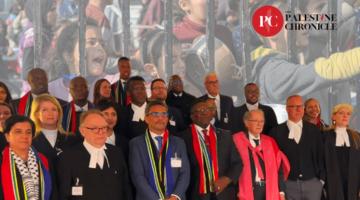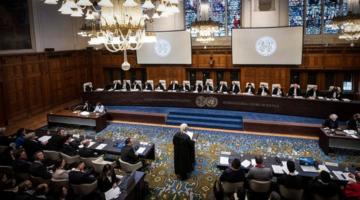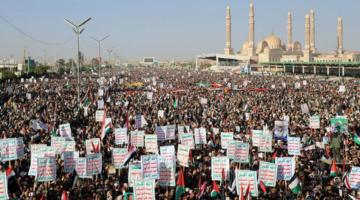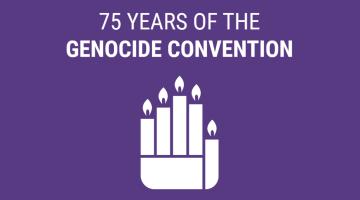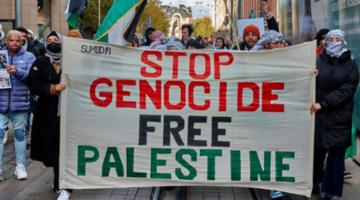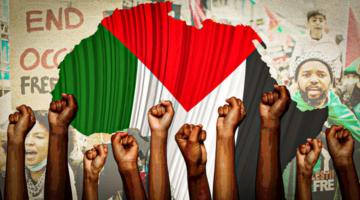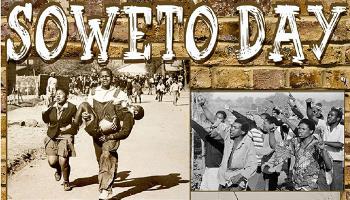“The Times fingered a British p.r. outfit as the culprit that popularized the belief that ‘white monopoly capital’ must be overthrown to complete the unfinished South African revolution.”
The New York Times, the world’s premier journalistic purveyor of a “fake,” imperial, and profoundly white capitalist world view -- masquerading as all the news that’s fit to print -- wants us to believe that a now-bankrupt London-based public relations firm is behind South Africa’s regime-shaking debate over the rule of “white monopoly capital.”
It’s an amazing claim, that could only be put forward with a straight face by an institution marinated in centuries of white supremacy, whose operatives can perceive only fellow white hands and minds as makers of history -- or even coiners of useful terms.
In a February 4 business section article titled, “How Bell Pottinger, P.R. Firm for Despots and Rogues, Met Its End in South Africa,” the Times fingered the British p.r. outfit as the culprit that popularized the belief that “white monopoly capital” must be overthrown to complete the unfinished South African revolution. Bell Pottinger worked for the Gupta brothers, three businessmen from India that are widely believed to have corruptly “captured” the government of President Jacob Zuma for their own enrichment. The Guptas are reportedly divesting much of their vast South African holdings, and Zuma now clings to state power by his fingernails, having lost control of the ruling African National Congress leadership to the faction led by Cyril Ramaphosa, the labor leader turned wealthy multinational corporate shareholder.
“The term ‘white monopoly capital’ has been central to the South African political conversation since before Nelson Mandela was imprisoned for treason in 1962.”
The Times claims the Guptas and their p.r. firm set these events in motion by injecting the concept of “white monopoly capital” into the debate, thus poisoning the political dialogue, in the Times’ view. By 2017, Bell Pottinger “stood accused of setting off racial tensions through a furtive campaign built on Twitter bots, hate-filled websites and speeches…pushing a highly toxic narrative, namely that whites in South Africa had seized resources and wealth while they deprived blacks of education and jobs,” reporter David Segal wrote. “The message was popularized with an incendiary phrase, ‘white monopoly capital.’”
According to the Times, “white monopoly capital,” “a phrase that for years had been confined to left-wing academic circles, was suddenly unavoidable.”
That’s utter nonsense. The term “white monopoly capital,” in those precise words or essential meaning, has been central to the South African political conversation since before Nelson Mandela was imprisoned in 1962. The demand for majority control of the nation’s land and major industries was articulated in the anti-apartheid movement’s seminal political document, the Freedom Charter of 1955:
“The national wealth of our country, the heritage of all South Africans, shall be restored to the people;
The mineral wealth beneath the soil, the banks and monopoly industry shall be transferred to the ownership of the people as a whole… .”
It is an indisputably socialist document directly addressing the white capitalist monopoly on power. Although the honchos of the ruling party, the ANC, have betrayed its principles, in practice, at every juncture since the fall of apartheid in the early Nineties, the entirety of South African political leadership is still compelled to give lip service to the Charter and its embedded demands. The Brits that ran Bell Pottinger worked for the Gupta brothers, but their political client was President Jacob Zuma, then leader of the ANC, who needs no spin-doctor or “Twitter bots” to articulate his public position on “white monopoly power.”
“The Freedom Charter is an indisputably socialist document directly addressing the white capitalist monopoly on power.”
“The minority dominates land. That’s why we are saying there is a monopoly. It is not insult,” said Zuma, in an interview with South African television, last year. “It is a fact, it’s not manufactured. We are telling the truth. We fought, they took everything, political power which we now have. They took economical power and land. Let us take the mines, companies who dominate in mines, few are benefiting. You will find the same companies in charge. That means they are dominating. They are monopolizing, they are not black.
“You have companies that are white, they start from big commodities to the broom, they are monopolies, they should be called by what they practice. There is monopoly capital and in South Africa it is white. Because of our history it does have a color and it is white,” Zuma said.
The political crisis in South Africa derives from the failure of Zuma and the leadership of the ANC to actually oust white monopoly capital from the commanding heights of the economy, after nearly a quarter century in nominal power. Instead, they have fatted a new class of Black bourgeoisie, most of them ANC-connected, as junior partners with the white monopolists through the government’s Black Economic Empowerment policies. Most notable among these nouveau Black capitalists is Cyril Ramaphosa, now president of the ANC and near certain to succeed Zuma in the next election, if not much sooner.
“They have fatted a new class of Black bourgeoisie, most of them ANC-connected, as junior partners with the white monopolists.”
Ramaphosa was once leader of the mine workers union, but became one of the richest men in South Africa, with assets estimated at $450 million, thanks to his alliance with the multinational corporate mine owners. Ramaphosa is widely believed to have given the green light for police to massacre 34 striking workers at the Marikana mine operated by the Lonmin conglomerate, of which he was a director, in 2012.
Ramaphosa and a majority of the current members of the ANC’s executive committee now claim that “white monopoly capital” is “no longer part of the party’s lexicon,” although the iissue remains hotly contested and factionalized. Ramaphosa was last year reported to have “criticized the use of the phrase ‘white monopoly capital’ and said it was an invention of a highly paid public relations company to ‘protect their clients’ accused of state capture.”
Thus, the New York Times is running the same line as Ramaphosa, the darling of the multinational corporations that were incensed at having to share access to Zuma’s presidency with the intrusive (and brown) Gupta brothers. Under Ramaphosa, their absolute monopoly on the state’s attentions will no doubt be restored.
Joel Netshitenzhe, a Ramaphosa ally on the ANC national executive committee, said, “the phenomenon of monopoly capital is a global one and manifests itself differently. In that context, it would therefore not be correct to characterize ours simply as white monopoly capital. That relationship would apply whether it’s Japanese, Indian, white or whatever category you can think about," he said.
Apparently, the global system created by white monopolists -- and still dominated by them, in South Africa and around the planet -- loses its essential, racialized character when darker capitalists throw some money in game. Supposedly, the same transformation occurs when one mixes in a gaggle of Black Economic Empowerment program beneficiaries. Voila! Racial capitalism eliminated! Even if nothing changes in the lives of the masses of people.
“Ramaphosa and a majority of the current members of the ANC’s executive committee now claim that “white monopoly capital” is “no longer part of the party’s lexicon.”
The torrential flows of capital out of South Africa and the rest of the continent are the legacy of centuries of colonial and imperial extraction by a system that invented white supremacy to justify its existence. It still exists -- and its impact on Black people on the ground in South Africa remains profoundly racialized.
Zuma’s successors are scrambling to shed their old vocabularies. An exhaustive article by Christopher Malikane, an associate professor of economics, at Wits University, shows that the term “white monopoly capital” was never “confined to left-wing academic circles” in South Africa, but rather was an integral element of political speech among movers and shakers in all three prongs of the Tripartite Alliance that has ruled South Africa since 1994: the ANC, the South African Communist Party, and the labor federation, COSATU. Lowly professors and activists like Malikane were also quite at home with the term, long before the London p.r. firm is said to have “invented” it. Malikane dug up one of his old papers from 2002, and found that it was “replete with the concept "white monopoly capital."
“The term ‘white monopoly capital’ was never ‘confined to left-wing academic circles’ in South Africa.”
He documents the term’s presence in a 2012 joint report of the South African Communist Party and COSATU:
"The two allies resolved to stand shoulder-to-shoulder, together with the ANC, in the struggle to deepen our national democratic revolution, to end the national oppression of the majority, the super-exploitation of workers by white monopoly capitalism and the triple oppression faced by women, in order to create a new non-racial, non-sexist, democratic and prosperous South Africa," it reads.
Further back in time, Malikane finds the offending term in an address by labor federation chief Blade Nzimande, in 1997:
"The call for only organised workers to make sacrifices, without calling for the same from white monopoly capital, is essentially a reactionary call for the maintenance of the super-exploitation of the black working class."
South African Premier Mbhazima Shilowa, speaking to a Black Economic Empowerment strategy lunch in 2006, said:
"As I have indicated in the past, we need to send a clear message that the time for white monopoly capital to pay lip service to economic transformation and empowerment, especially for women, is past and will not be rewarded in Gauteng"
And former COSATU General Secretary Zwelinzima Vavi, at a 2005 Special Congress of the South African Communist Party:
"Economic power is still in the hands of white monopoly capital. The aspirant and vocal black bourgeoisie remains numerically small and depends heavily on the state and white business for its survival."
“The term is in the process of being purged at the behest of capital.”
Clearly, “white monopoly capital” did not fall out of use as a staple term of the South African political class. Rather, the term is in the process of being purged at the behest of multinational (dare we say “white”?) capital.
Fortunately, the leadership of the African National Congress can no longer dictate politics in South Africa. The insurgent Economic Freedom Fighters, which has been building an electoral challenge to the ANC from the left since 2013, has no problem with the term “white monopoly capital.” Neither does Irvin Jim, head of NUMSA, the nation’s largest union. White monopoly capital is real, and reproduces itself:
“The stranglehold of a small number of white monopoly capitalists over the great bulk of our country’s wealth and resources is based on colonial dispossession and promotes racial oppression. This concentration of wealth and power perpetuates the super-exploitation of millions of black workers.”
Back in 2014, predating Bell Pottinger’s contract with President Zuma, Irvin Jim spoke to the historical realities of South Africa:
“Basically you have white monopoly capital, corporate multinationals and the white population who dominate the South African economy. The freedom charter in this case is very clear. It says mineral wealth, the soil, banks and monopoly industries must be transferred to the ownership of the people as a whole. That is the cornerstone for non-racialism and non-sexism. To leave the existing economic conditions intact is basically to allow racial supremacy to continue.”
Which is the deal that President-to-be Cyril Ramaphosa has reaffirmed with his mentors and patrons among the white monopoly capitalists. Perhaps he will make similar arrangements with Japanese and Indian capitalists, as well, as their numbers increase, but that will not alter the raciaized nature of the system as experienced by the South African people.
South Africa is, perhaps, unique, in that it is a non-liberated country whose broad political discourse is saturated with Marxist language. Even the operatives of the oppressor, like Cyril Ramaphosa, who calls himself a “committed socialist,” speak “Marxian.” The term “white monopoly capital” speaks to the reality of South African political economy. It will not be erased from that nation’s vocabulary by order of the next president, or the New York Times.
BAR executive editor Glen Ford can be contacted at Glen.Ford@BlackAgendaReport.com

